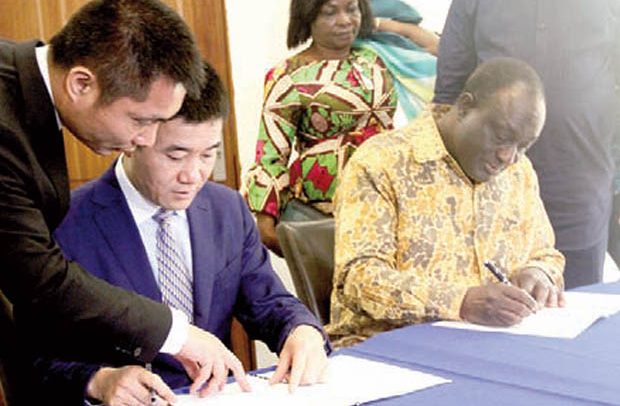Alan Kyeremanten and the Chinese team signing the 1D1F MoU yesterday
Ministry of Trade and Industry yesterday signed contracts with the China National Building Materials Corporation in Accra for the construction of 22 factories under the ‘One District, One Factory (1D1F)’ initiative.
The 22 Engineering Procurement and Construction contracts were signed between some Ghanaian business executives, selected district assemblies represented by the ministry of trade and industry and the Chinese contractors.
The projects, valued at $400 million, are located in 22 districts across the 10 regions.
Speaking at the signing ceremony, Minister of Trade and Industry Alan Kyerematen, indicated that plans are far advanced to roll out many similar projects in other districts in the coming months.
The 22 projects, he said, have been selected as a result of their significant export potential, particularly in the Chinese market.
The investment value, which is estimated at about $400 million, is expected to generate significant economic benefits, including employment generation and tax revenue.
The minister further stated that the 1D1F initiative is designed as a comprehensive programme for rural industrialization, involving the setting up of at least one medium to a large-scale factory or industrial enterprise in each of the administrative districts of Ghana based on the natural resource endowment or comparative advantage of each district.
Mr Kyerematen indicated that a total of 707 business plans had been received from business promoters – out of which 602 had been reviewed by the Technical Support Group (TSG) of the ministry, with 313 of the plans considered to be feasible for implementation.
The trade minister praised the Chinese counterpart – CNBM Corporation – for honouring a pledge made in 2017 in support of the government’s industrial transformation agenda.
As part of this turnkey agreement, CNBM, which is known for high quality modern facility and factory construction, will support businesses to market and sell their products in the Chinese market through strategic partnerships and alliances.
The selected products, which include edible vegetable oil, starch, alcohol and garment, will also be sold in the ECOWAS sub-region and the local Ghanaian market.


